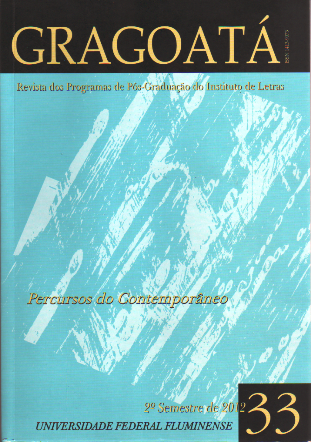O Rio de Janeiro inscrito em Memórias Póstumas de Brás Cubas
DOI:
https://doi.org/10.22409/gragoata.v17i33.33016Palavras-chave:
Literatura, Machado de Assis, Memórias Póstumas de Brás Cubas, espaço urbanoResumo
O texto literário, como manifestação artística, remete ao contexto histórico em que foi produzido. Nesse sentido, as referências espaciais contribuem para a instalação da verossimilhança textual e traduzem significações simbólicas, expressando ritos e valores sociais. Este artigo investiga a significação que menções a objetos e à espacialidade, presentes em Memórias Póstumas de Brás Cubas, introduzem no romance de Machado de Assis, permitindo depreender aspectos da sociedade carioca do final do século XIX, bem como posições axiológicas por eles conotadas. A partir da análise, conclui-se que Machado de Assis não é um mero descritor de cenários, mas um acurado crítico que, ao inscrever a cidade do Rio de Janeiro em seu romance, se posiciona diante de seu contexto histórico-social e o avalia.
Downloads
Downloads
Publicado
Edição
Seção
Licença
AUTORIZAÇÃO
Autores que publicam em Gragoatá concordam com os seguintes termos:
Os autores mantêm os direitos e cedem à revista o direito à primeira publicação, simultaneamente submetido a uma licença Creative Commons Atribuição 4.0 Internacional (CC BY 4.0), que permite o compartilhamento por terceiros com a devida menção ao autor e à primeira publicação pela Gragoatá.
Os autores podem entrar em acordos contratuais adicionais e separados para a distribuição não exclusiva da versão publicada da obra (por exemplo, postá-la em um repositório institucional ou publicá-la em um livro), com o reconhecimento de sua publicação inicial na Gragoatá.
A Gragoatá utiliza uma Licença Creative Commons - Atribuição CC BY 4.0 Internacional.











